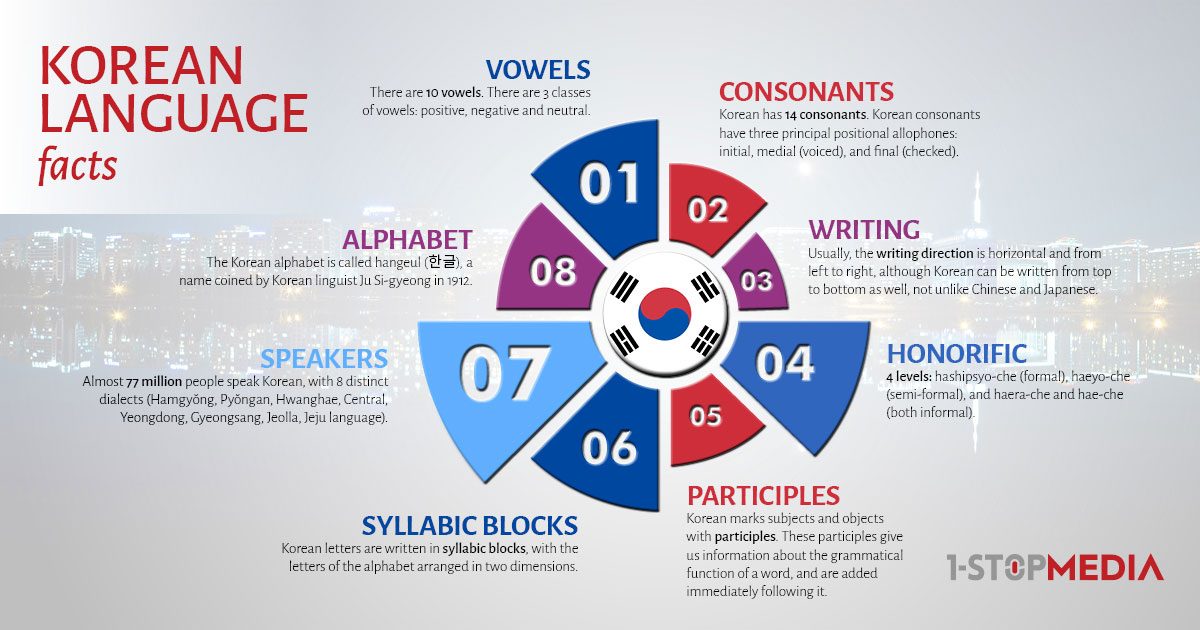Korean Language
Korean, the national language of South and North Korea, is one of the world’s oldest living languages. It is very similar to Japanese in terms of grammar, and over 70% of its vocabulary is “borrowed” from Chinese. Korean language has a very sophisticated honorific system, which can be challenging for translators and foreigners to master.
The Korean Media Scene
Korean media has been on the international scene for quite some time and it is causing quite a hype these days with the evergrowing popularity of Korean dramas, K-pop culture, and famous Korean directors. We definitely can’t skip mentioning the Oscar-winning movie “Parasite” which wouldn’t be that successful if the movie was only in Korean.
The popularity of Korean media, however, brings up the necessity of skillful subtitle translations and other media services that the international media scene wasn’t ready to tackle. A good example here is poorly done subtitles which don’t transmit the culture behind the language properly. That leads to a completely different message sent to the audience, which may sometimes even sound ridiculous.
The need for adequate professional media translations performed by people with actual experience in Asian languages along with linguists with relevant experience has never been more real.
Facts that affect Korean to English and to other languages translations:

The complexity of Korean Translation
1. The written language > Translation Service
- The structure: Korean can’t be translated effectively on a phrase-by-phrase basis, as it incorporates an entirely different word and sentence order compared to most Western languages, and there are various types and unique usage scenarios for postpositions (or particles) which would render literally translated text nonsensical.
- Grammar: In Korean, subjects and objects are marked with participles. These participles are added after the word and give us information about the grammatical function of that word. Along with that, they change the form, depending on if the following word starts with a vowel or a consonant. Single sentences like “Eva dislikes John. John dislikes Eva.” may not be difficult to translate, but they definitely look more complicated in Korean than they do in English, in this case: 에바는 존을 싫어한다. 존은 에바를 싫어한다. That’s how those single sentences are written in Korean.
- The sensitivity: Topics or names related to North Korea or Japan should be treated carefully. For example, Sea of Japan should be adapted as East Sea (동해), Liancourt Rocks to Dokdo Island (독도), South Korea to Korea or the Republic of Korea (한국 or 대한민국).
2. The spoken language > Media Service
Korean spoken language is a challenge to many non-Korean speakers due to the honorifics and the different dialects.
- The honorifics: Korean is a language that uses a lot of honorifics, with 4 levels of formality: hashipsyo-che (formal), haeyo-che (semi-formal), haera-che and hae-che (both informal). In order to choose the appropriate level based on the content characteristics and target audience is very important for the quality of Korean translation, because misusing honorifics may lead to appearing as if you’re not addressing people with the proper courtesy.
- The dialects: There are about 6 dialects* in Korean which is different among geographical locations just like many other languages in other countries. Mainly, the dialect used in Seoul and Incheon is Gyeonggi dialect (경기 방언) which is also the standard language that everybody understands (even though they may speak other dialects). It is taught in school and used in news broadcasting. In the south like Busan, Daegu and Ulsan, they speak faster in Gyeongsang dialect (경상 방언).
- Gyeonggi dialect (경기 방언)
- Gangwon dialect (강원 방언)
- Chungcheong dialect (충청 방언)
- Gyeongsang dialect (경상 방언)
- Jeollado dialect (전라도 방언)
- Jeju dialect (제주 방언)
1-StopMedia’s solution for you
At 1-StopMedia we believe that sharing our experience with our clients and partners is an essential part of delivering the services your company needs. We branched out from 1-StopAsia with the single purpose of concentrating on improving our media translation services and creating a flawless and tailored solution for LSPs and large business companies that require media services for Asian languages.
Drawing from over 20 years of experience, we benefit from the skillful and accurate translators we have and at the same time fit our process to match your workflow and requirements. Our project managers are experienced in working with Asian languages, work as per ISO 17100 and ISO 9001 and at the same time can advise you on the type of services your company needs.
Request a Free Quote
We, at 1-StopMedia, are aware that responsiveness and excellent project management are the essence when working within the translation industry.
If you feel it is time to improve your time-management and pay more attention to your clients, get in contact with our Production Team and check how we can help you achieve it.
Ask us anything you need to know about:
- quotes and pricing
- translations and media services
- Asian languages
Start your new project with us today! All you have to do is fill in the form on the right and get your free quote.